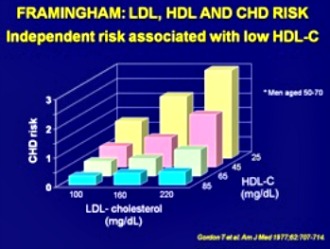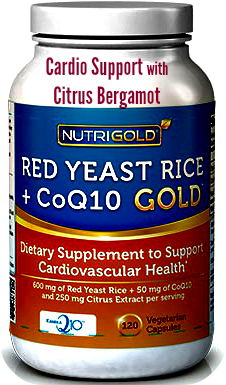How to Raise HDL Cholesterol Levels and
Lower Heart Attack Risk!
Gene Millen, Author - Revised 8/21/15
Raising Your HDL good) Cholesterol Can Cure Heart Disease!
 Framingham Study Shows Importance of Raising HDL Cholesterol
Framingham Study Shows Importance of Raising HDL Cholesterol
The research study concluded;"High HDL levels are associated with longevity and are protective against the development of atherosclerotic disease. In the Framingham Study, risk for CAD increases sharply as HDL levels fall progressively below 40 mg/dL."
The INTERHEART study, which was recently published in the prestigious Lancet Medical Journal has come to some very interesting conclusions.
This 10-year research has been called the most robust study ever conducted on heart attack risk factors. About 15,000 heart attack patients recruited from around the world were matched with the same number of subjects who had not experienced any heart problems.
The Number One Risk Factor for Heart Disease.
Neither high cholesterol nor high LDLs (the bad cholesterol) showed up among the top causes of heart attacks!
According to INTERHEART, the number one risk factor of heart disease is a poor ratio of APO-B to APO-A1. These are sub classes of proteins found in cholesterol, which are infrequently measured by most doctors.
APO-B is the protein found primarily in the LDL cholesterol and APO-A1 is found in the good HDL cholesterol.
In this study neither high cholesterol nor high LDLs appeared among the top risk factors. This was not good news for the makers of the statin drugs which lower LDLs but do little to improve HDL cholesterol.
To raise HDL cholesterol is more important in lowering your heart attack risk than reducing LDLs.
There were several more pieces to the cholesterol and heart disease puzzle. The INTERHEART study concluded that the relative risk of a heart attack could be lowered by 80% by doing just three things.
- Eating plenty of fruits and vegetables,
- Getting regular exercise and
- Avoiding smoking.
The Power of Raising HDL Cholesterol
As a youngster growing up I remember clearly waiting expectantly for the next issue of Superman to read what feats my hero would accomplish.
He was, "faster than a speeding bullet, more powerful than a speeding locomotive and could leap tall buildings with a single bound."
When it comes to saving your life HDL cholesterol is the superman that can accomplish even greater feats.
HDL cholesterol acts like a miniature hydraulic vacuum cleaner, streaming through your arteries (not quite as fast as a speeding bullet), scooping up the heart- stopping LDL cholesterol, and carrying it back to your liver where it can be delt with.
HDLs also douse the fires of inflammation. It is this smoldering inflammation and oxidation that causes the cholesterol in our arteries to turn rancid and clog our arteries.
Do you know what your HDL cholesterol level is and what it should be?
Although HDLs are routinely measured, many doctors provide this information to their patients only on a need to know basis.
This important knowledge is probably restingin your medical file, unnoticed and unappreciated like an unassuming Clark Kent at the Daily Planet. This is your blood that was tested and your life that is on the line.
You should ask for copies of your lab reports, which will provide you with the information to take corrective action.
Viewed by itself, patients' HDL should ideally be 60 mg/dL or greater. At a minimum, men's HDL should be 35 mg/dL and women's 45 mg/dL or more.
Take a deep breath and get busy. If it is between 40-59 it is considered "normal", but like the doctor's comments in one of my favorite cartoons;
"Your blood pressure is off the chart, you're over weight, out of shape and your cholesterol is god-awful. In short I find you perfectly normal."
New clinical studies show citrus bergamot extract
can raise HDL Cholesterol a whopping 29%!
The story begins in the highly acclaimed Department of Cardiology and Vascular Medicine and Atherosclerosis Unit in Rome Italy.
Inquisitive, highly skilled researchers were scratching their heads.
These heart disease experts wondered why the incidence of heart disease in the Cambrian Region of Southern Italy was significantly less than it was in other areas of their country.
What they discovered may boggle your mind as it has mine. Who would have guessed that the inside peal of a citrus fruit could reduce nearly every key risk factor of heart disease and lower the possiblility of having a heart attack?
 Alan Sosin, MD, Director of The Institute for Progressive Medicine provides a summary;
Alan Sosin, MD, Director of The Institute for Progressive Medicine provides a summary;
"Citrus Bergamot shown to increase HDL (good) Cholesterol by 29%, lower LDL cholesterol by 27% and triglycerides by 34%.
"It has benefits superior to statins inreducing triglycerides, raising HDL (good) cholesterol, and altering the size of LDL molecules from small and dense to large and fluffy thus reducing their plaque-forming effect.
"Bergamot citrus has also demonstrated a blood sugar lowering effect. Thus it can help control insulin resistance and diabetes, while at the same time managing the almost universal lipid abnormalities seen in diabetics."
Citrus Berganot Extract sends metabolic syndrome packing!
An estimated 75 million Americans have metabolic syndrome, a constellation of symptoms associated with increased risk of diabetes and heart disease.
The condition is characterized by obesity, insulin resistance, and high cholesterol, triglycerides, and blood pressure.
"This is the only supplement on the planet that works on every parameter of metabolic syndrome," says Australian cardiologist Ross Walker, M.D.
The pharmaceutical industry must be shaking in their boots about this discovery, and are no doubt trying to come up a drug that can compete with this natural inexpensive remedy.
Bergamot's cardio-protective and cholesterol-lowering antioxidants is exciting, given the fact that the drugs used to treat heart disease, our nation's number one killer, are largely ineffective and come with a whole host of dangerous side effects.
Cardiologists around the world are taking notice of the benefits of citrus bergamot extract, and are offering it to their patients instead of statin drugs, which have significant side effects.
 Renowned Heart Surgeon Stephen Sinatra, MD Says This About Citrus Bergamot Extract...
Renowned Heart Surgeon Stephen Sinatra, MD Says This About Citrus Bergamot Extract...
"This is the biggest discovery in cardiovascular health since CoQ10 and fish oil.This remarkable citrus extract from the southern coast of Italy is clinically shown to improve cholesterol ratios in as little as 30 days!"
 Dr. Julian Whitaker, a pioneer and trusted authority of alternative medicine says, "Discover the "Heart Miracle" in this Italian fruit.
Dr. Julian Whitaker, a pioneer and trusted authority of alternative medicine says, "Discover the "Heart Miracle" in this Italian fruit.
"I'm thrilled to recommend Citrus Bergamot, a powerful, all-natural ingredient that provides TOTAL cholesterol support by targeting all the critical elements of cholesterol management."
Side Effects and Cautions of Citrus Bergamot Extract
Bergamot has no known side effects, however it is not recommended that it be taken with statin drugs. The the combination could cause your cholesterol to go too low and our body and brain need cholesterol for healthy heart and brain health.
Lipitor and other statin drugs have been shown to cause serious side effects, including an increased risk for developing diabetes, especially among older women!
Summary of Clinical Studies
Citrus Bergamot Extract Benefits*
Test results achieved in 30 day period.
- HDL cholesterolincreased by 29% (reverses plaque in heart arteries)
- Total cholesterol reduced by 30%
- LDL cholesterol (clogs arteries when oxidized) reduced by 27%
- Triglycerides (key heart disease risk)reduced by 34%
- Glucose (blood sugar) lowered by 22%
The New Cardio Support Formula
featuring Citrus Bergamot, Red Yeast
Rice and CoQ10 is ON SALE NOW in our
Heart Supplement Store!
"These Numbers Have Blown My Doctor's Mind!"
"Gene: I just wanted to take a minute and share with you the results of my latest blood work.
"My total cholesterol was 114, my LDL was 48, my HDL was 51 (up from 35), and my triglycerides were 111.
"These numbers have blown my doctor's mind. He has tried for years to get my HDL up above 40.
The only thing different that I am doing is taking the Cardio Support Formula with Red Yeast Rice, Citrus Bergamot and CoQ10...along with Krill Oil and the exercise program that you outlined for me.
"I don't know which of these did the trick, or if it was a combination, but these are the best numbers I have ever had....Thank You BIG TIME!"
Odis Summers, Lubbock, TX
